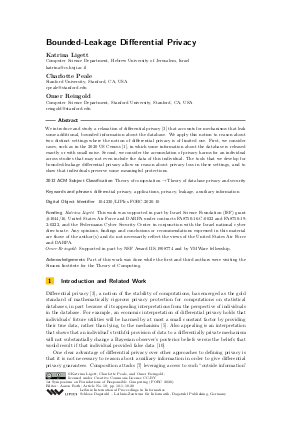Bounded-Leakage Differential Privacy
Authors Katrina Ligett, Charlotte Peale, Omer Reingold
-
Part of:
Volume:
1st Symposium on Foundations of Responsible Computing (FORC 2020)
Part of: Series: Leibniz International Proceedings in Informatics (LIPIcs)
Part of: Conference: Symposium on Foundations of Responsible Computing (FORC) - License:
 Creative Commons Attribution 3.0 Unported license
Creative Commons Attribution 3.0 Unported license
- Publication Date: 2020-05-18
File

PDF
LIPIcs.FORC.2020.10.pdf
- Filesize: 0.5 MB
- 20 pages
Document Identifiers
Subject Classification
ACM Subject Classification
- Theory of computation → Theory of database privacy and security
Keywords
- differential privacy
- applications
- privacy
- leakage
- auxiliary information
Metrics
- Access Statistics
-
Total Accesses (updated on a weekly basis)
0Document
0Metadata
Abstract
We introduce and study a relaxation of differential privacy [Dwork et al., 2006] that accounts for mechanisms that leak some additional, bounded information about the database. We apply this notion to reason about two distinct settings where the notion of differential privacy is of limited use. First, we consider cases, such as in the 2020 US Census [Abowd, 2018], in which some information about the database is released exactly or with small noise. Second, we consider the accumulation of privacy harms for an individual across studies that may not even include the data of this individual. The tools that we develop for bounded-leakage differential privacy allow us reason about privacy loss in these settings, and to show that individuals preserve some meaningful protections.
Cite As Get BibTex
Katrina Ligett, Charlotte Peale, and Omer Reingold. Bounded-Leakage Differential Privacy. In 1st Symposium on Foundations of Responsible Computing (FORC 2020). Leibniz International Proceedings in Informatics (LIPIcs), Volume 156, pp. 10:1-10:20, Schloss Dagstuhl – Leibniz-Zentrum für Informatik (2020)
https://doi.org/10.4230/LIPIcs.FORC.2020.10
BibTex
@InProceedings{ligett_et_al:LIPIcs.FORC.2020.10,
author = {Ligett, Katrina and Peale, Charlotte and Reingold, Omer},
title = {{Bounded-Leakage Differential Privacy}},
booktitle = {1st Symposium on Foundations of Responsible Computing (FORC 2020)},
pages = {10:1--10:20},
series = {Leibniz International Proceedings in Informatics (LIPIcs)},
ISBN = {978-3-95977-142-9},
ISSN = {1868-8969},
year = {2020},
volume = {156},
editor = {Roth, Aaron},
publisher = {Schloss Dagstuhl -- Leibniz-Zentrum f{\"u}r Informatik},
address = {Dagstuhl, Germany},
URL = {https://drops.dagstuhl.de/entities/document/10.4230/LIPIcs.FORC.2020.10},
URN = {urn:nbn:de:0030-drops-120265},
doi = {10.4230/LIPIcs.FORC.2020.10},
annote = {Keywords: differential privacy, applications, privacy, leakage, auxiliary information}
}
Author Details
Funding
- Ligett, Katrina: This work was supported in part by Israel Science Foundation (ISF) grant #1044/16, United States Air Force and DARPA under contracts FA8750-16-C-0022 and FA8750-19-2-0222, and the Federmann Cyber Security Center in conjunction with the Israel national cyber directorate. Any opinions, findings and conclusions or recommendations expressed in this material are those of the author(s) and do not necessarily reflect the views of the United States Air Force and DARPA.
- Reingold, Omer: Supported in part by NSF Award IIS-1908774 and by VMWare fellowship.
Acknowledgements
Part of this work was done while the first and third authors were visiting the Simons Institute for the Theory of Computing.
References
-
John M Abowd. The us census bureau adopts differential privacy. In Proceedings of the 24th ACM SIGKDD International Conference on Knowledge Discovery & Data Mining, pages 2867-2867, 2018.

- Aref N Dajani, Amy D Lauger, Phyllis E Singer, Daniel Kifer, Jerome P Reiter, Ashwin Machanavajjhala, Simson L Garfinkel, Scot A Dahl, Matthew Graham, Vishesh Karwa, et al. The modernization of statistical disclosure limitation at the us census bureau. In Washington, DC: US Census Bureau. Available at: https://www2.census.gov/cac/sac/meetings/2017-09/statistical-disclosure-limitation.pdf, 2017. URL: https://www2.census.gov/cac/sac/meetings/2017-09/statistical-disclosure-limitation.pdf.
-
Cynthia Dwork, Frank McSherry, Kobbi Nissim, and Adam Smith. Calibrating noise to sensitivity in private data analysis. In Theory of cryptography conference, pages 265-284. Springer, 2006.

-
Cynthia Dwork and Moni Naor. On the difficulties of disclosure prevention in statistical databases or the case for differential privacy. Journal of Privacy and Confidentiality, 2(1), 2010.

-
Cynthia Dwork and Aaron Roth. The algorithmic foundations of differential privacy. Foundations and Trendsregistered in Theoretical Computer Science, 9(3-4):211-407, 2014.

-
Cynthia Dwork, Guy N Rothblum, and Salil Vadhan. Boosting and differential privacy. In 2010 IEEE 51st Annual Symposium on Foundations of Computer Science, pages 51-60. IEEE, 2010.

-
Srivatsava Ranjit Ganta, Shiva Prasad Kasiviswanathan, and Adam Smith. Composition attacks and auxiliary information in data privacy. In Proceedings of the 14th ACM SIGKDD international conference on Knowledge discovery and data mining, pages 265-273, 2008.

- Simson L Garfinkel. Modernizing disclosure avoidance: Report on the 2020 disclosure avoidance system as implemented for the 2018 end-to-end test, 2018. URL: https://www.census.gov/about/cac/sac/meetings/2017-09-meeting.html.
-
Simson L Garfinkel, John M Abowd, and Sarah Powazek. Issues encountered deploying differential privacy. In Proceedings of the 2018 Workshop on Privacy in the Electronic Society, pages 133-137, 2018.

-
Shiva P Kasiviswanathan and Adam Smith. On the’semantics' of differential privacy: A bayesian formulation. Journal of Privacy and Confidentiality, 6(1), 2014.

-
Daniel Kifer and Ashwin Machanavajjhala. No free lunch in data privacy. In Proceedings of the 2011 ACM SIGMOD International Conference on Management of data, pages 193-204, 2011.

-
Daniel Kifer and Ashwin Machanavajjhala. Pufferfish: A framework for mathematical privacy definitions. ACM Transactions on Database Systems (TODS), 39(1):1-36, 2014.

-
Frank McSherry and Kunal Talwar. Mechanism design via differential privacy. In FOCS, pages 94-103, 2007.

